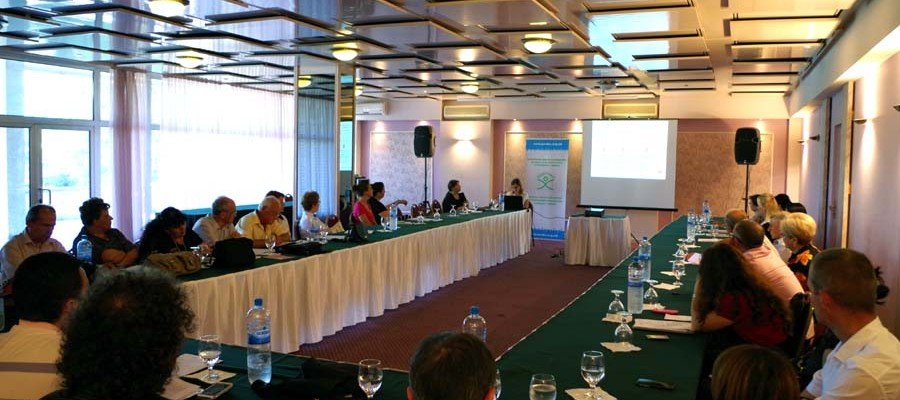Within the European Project INVESTT of EASPD – European Association of Service Providers for Persons with Disabilities, the Republic Center for Support of Persons with Intellectual Disability – PORAKA, in cooperation with EASPD and the center for Training, Education and Care – DRAGA from Slovenia, organized one-day event – forum on the subject: “Vocational Educational Training and Employment of Persons with Disabilities”.
The aim of the forum was to present discussion among the stakeholders in the area of vocational educational training and employment of persons with disabilities, and to present the European trends and Macedonian experiences, practice and ongoing reforms in this area.
The forum was held on 3 June 2015 at Hotel “Continental”, with representatives from the Ministry of Labour and Social Policy the Employment Agency, special primary and secondary schools in Macedonia for children with intellectual disability, representatives from the Non-Governmental sector.
Vasilka Dimoska MD, Program Manager in the Republic Center for Support of Persons with Intellectual Disability, opened the forum and moderated the event. She stressed that the forum represents a great opportunity for considering all current activities in our country regarding employment of persons with disability. Additionally, she emphasized that the forum gives possibilities for exchanging experiences among the stakeholders in the area of vocational educational training and employment of persons with disabilities, furthermore, for considering the future steps that Macedonia might take in order to save time and finances. In relation to employment of persons with disabilities, Vasilka Dimoska MD, highlighted that the trend is increasing, and the new law on employment of persons with disabilities, which is in preparation phase, will open opportunities for employing persons with disabilities on the open labour market, thus will provide for equalization of their opportunities. This new legislation offers possibilities for introducing rehabilitation programmes, i.e. training and additional training for these persons in order to be included in the modern trends of employment.
Experiences from Slovenia and Europe were conveyed by Ms.Tamara Narat from the Social Protection Institute of the Republic of Slovenia. She presented the INVESTT project (Inclusive Vocational Education and Specialized Tailor-Made Training) which main aim is providing vocational schools with specific information and suggestions in order to guide all students (including those with disabilities) towards open labour market. She also elaborated the Universal Design Concept and Reasonable Accommodation that need to apply in the areas of vocational training and employment of persons with disabilities.
Dusan Tomsic, representative from the Ministry of Labour and Social Policy spoke about the news in the draft-law on Employment of persons with disabilities. He introduces the others with the ongoing procedure regarding this piece of legislation and regretfully noted that at this time, the procedure for adoption of the new law is stopped, but it will soon proceed with the preparation and procedure of passing the law to bring it to an end.
Vlado Dodevski, representative from the Association of Sheltered workshops in Macedonia – ZAPOVIM, gave their views on the subject presenting the situation with the sheltered workshops, their number and stated that its number is unfortunatelly decreasing, then the number of employed persons with disabilities in these sheltered workshops and how they operate.
Vladimir Lazovski from the Association “Open the Windows” discussed the role of the assistive technology in the vocational education and in the employment of persons with disability, which is inevitable to introduce considering the technological advances in all areas of life.
Vlado Krstovski, Programme Assistant in the Republic Center – PORAKA, spoke about the role of the day centers for adolescents and adults with intellectual disability in developing the occupational skills and vocational training, as well as for gaining independent living skills. Moreover, he emphasized the need to gradually move towards the model of “supported employment” as the most appropriate model of employment, especially for persons with intellectual disability, and stresses that the introduction of the quota system is a positive step forward for advancing the rights of persons with disabilities in the area of employment.
Branimir Jovanovski, President of the National Union of Persons with Physical Disability Mobilnost Macedonia and President of the National Coordinative Body for Equal Rights of Persons with Disabilities in RM, spoke about the barriers in the education and employment faced by persons with physical disability, and at the same time he shared his personal experiences within the education and the obstacles he faced during the entire process.
Daniela Stojanovska, president of the Association of Students and Youth with Disabilities, highlighted the positive contributions that persons with disabilities have from the given opportunities to gain higher education, but also spoke about the many obstacles they face in realizing this right. At the same time, she also shared her own personal experiences in realizing her right to employment.
Vasilka Dimoska MD, in her closing remarks reiterated that hopes are given in the new law on employment of persons with disabilities, which would open up employment opportunities for persons with disabilities and would give them possibilities to become equal stakeholders in society as all the others.












